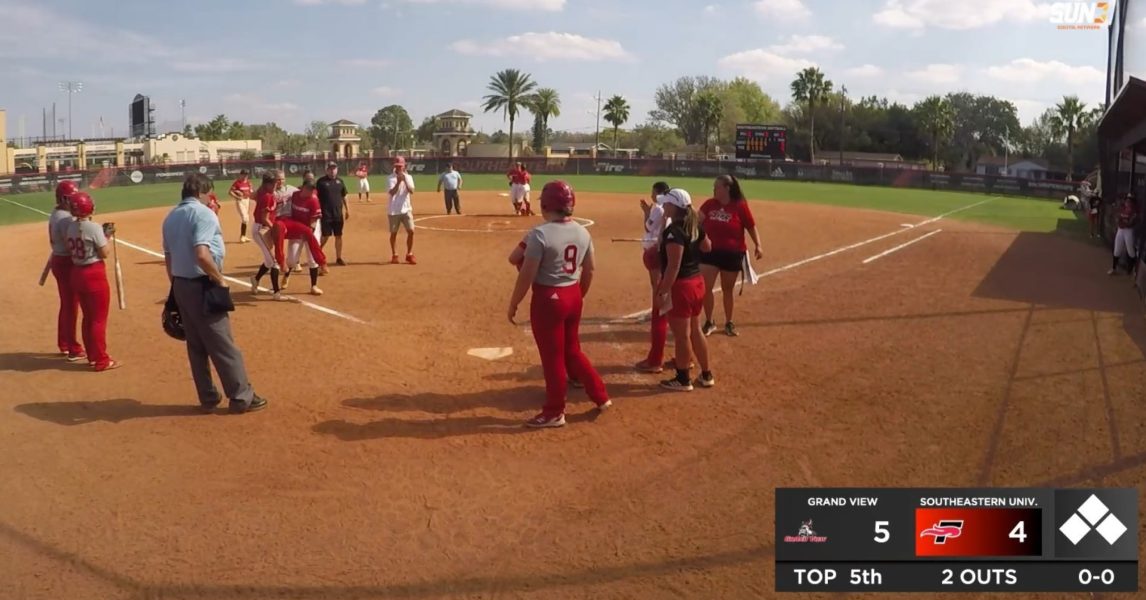When the Grand View Vikings catcher suffered an injury between first and second base after hitting a grand slam, the opposing team did something unconventional. Two players from Southeastern University, where I serve as president, picked up the catcher and carried her across three bases, making sure she tapped her foot on each base. The action put their opponent ahead in the game.
Having spent years in sports broadcasting, the two softball players acted in a way that I have rarely (if ever) experienced when I covered competitions – they placed sportsmanship in front of winning.
Within the last decade, our nation has experienced a decline in sportsmanship. More than half of sporting officials would say that sportsmanship is getting worse – with responsibility falling heavily on parents and coaches. The recent drama within the U.S. men’s national soccer team seems to indicate where sports may be headed.
But the incident on the softball field reveals good sportsmanship is still alive. When asked about their actions, the Southeastern players said it was something they were taught, and they would have loved for someone to do the same if it were their own teammate.
Through their quick actions, they demonstrated the importance of living out the definition of sportsmanship – fairness, respect for one’s opponent and graciousness in winning or losing.
It’s not just sports that can bring out the competitive edge in all of us. Competitiveness is everywhere – in the classroom, workplace, the political arena and even at home. While competition can bring out the worst in some, it can also bring out the best in us as we push toward higher standards. The way we respond and treat others in the process will determine the sentiment.
As I reflected on the players’ act of sportsmanship, the situation challenged me on three questions we should all ask ourselves.
Are we treating everyone equally?
As the players helped an opponent in need, it reminds us that we should act toward others in the way that we would want to be treated. It follows the familiar Golden Rule many of us were taught at a young age. But when push comes to shove, it’s easy to put our wishes in front of someone else’s (especially with a prize on the line). It’s critical in every circumstance to remember that fairness requires the best in humanity by valuing the dignity of others.
Are we respectful toward every individual?
Respect requires us to be thoughtful of others’ feelings. It teaches us the value of empathy (something we all desire). When we are respectful of others, we listen with intentionality and acknowledge another’s point of view even if it is vastly different from ours. It’s not a competition of who is right or wrong but rather an appreciation of what makes us unique.
Are we gracious in winning and losing?
Winning can bring out the best or worst in us. We can gloat to bolster our self-esteem. But it takes humility to recognize the process that led to the win. We should be the first to encourage others and thank them for the challenge that led to victory. And when we lose, it should be seen as an experience gained and an opportunity for growth rather than the depletion of our self-worth.
All of us have a unique opportunity in our culture to act in a way that demonstrates fairness, respect, unity and graciousness. This doesn’t mean we shy away from competition, difficult conversations or obstacles, but rather we should use them as strategic catalysts to demonstrate love and kindness.
In the past few years, there’s been a growing perception that sportsmanship and unity are diminishing in America. Even after aggressive midterm elections, The Vanderbilt Project on Unity and American Democracy found that the sense of unity is largely unchanged through the 2022 election season. There was even a sense of hope that the “general faith and trust in democracy is reaching a new equilibrium.”
This shows us that during our nation’s most divisive moments, we can still put unity, respect and fairness first. And the beautiful part about our positive actions is that they can inspire others. UCLA’s Bedari Kindness Institute recently found that kindness is, in fact, contagious.
When we go out of our way to come alongside someone, we can begin a chain reaction for the better. It’s just like in the Starbucks coffee line. When someone ahead of us pays for our coffee order, we are asked if we will do the same. And we most likely will say yes.
Today, we need more people who are willing to say that they will do the right thing – even if it costs them a game. It’s time we learn from these two softball players that civility and respect are not gone. Whether it’s in our communities, workplaces, political gatherings or even on the sports fields, we must act in a way that demonstrates respect, fairness and graciousness.
And the next time someone you’re competing against stumbles, ask yourself, would you be willing to lend a hand to pick them up?

